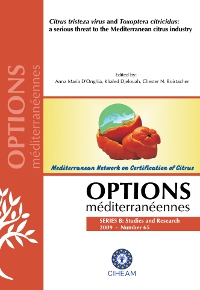
OM B65
Citrus tristeza virus and Toxoptera citricidus: a serious threat to the Mediterranean citrus industry
- [ Télécharger ]
- [ Exporter la citation ]
Vous pouvez télécharger la citation au format :
- [ Imprimer ]
Résumé
In 2002 Toxoptera citricidus, the most efficient vector of Citrus tristeza closterovirus (CTV), was reported for the first time in the Euro-Mediterranean region (northern Spain and Portugal). This situation urged the Mediterranean Research Network on Certification of Citrus (MNCC) of CIHEAM/MAIB to promote the first initiative at regional level for the prevention and/or control of the spread of CTV by this aphid, since tristeza is the most devastating citrus disease throughout the world. To that end, three dedicated workshops were organized in Portugal, Egypt and Turkey, where world renowned experts, MNCC partners, National Plant Protection officers, representatives of other International Organizations (FAO, EPPO) met and discussed advanced technical protocols and measures to set up a harmonized virus and vector control in the Mediterranean area. The workshops outcomes and other scientific contributions are reported in this publication, which represents the first tangible technical joint action promoted in the Mediterranean basin for the control of CTV. The introductory section reports a general overview on the current status of the Mediterranean Citrus industry, Citrus tristeza virus and Toxoptera citricidus; the first part offers an historical review on CTV and its vectors in the Mediterranean countries; the second part focuses on advances in methods for CTV detection, characterization and control; the third part discusses the regulations on the certification of citrus propagating materials and on the monitoring and eradication of CTV-infected trees. The regional project proposal on the mandatory control of CTV and its major vector T. citricidus in the Mediterranean region represents the conclusive MNCC contribution that should be taken into consideration by Governments so as to protect the Mediterranean citrus industry from social, economic and environmental risks.




